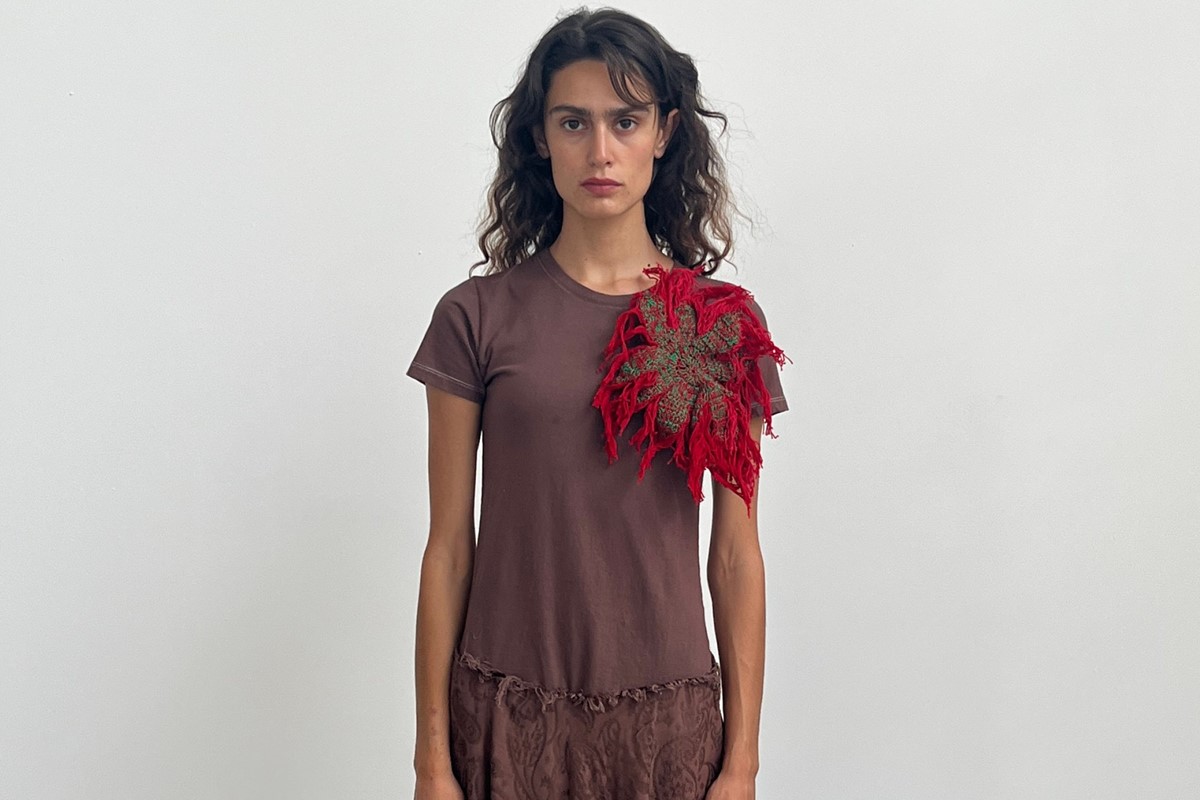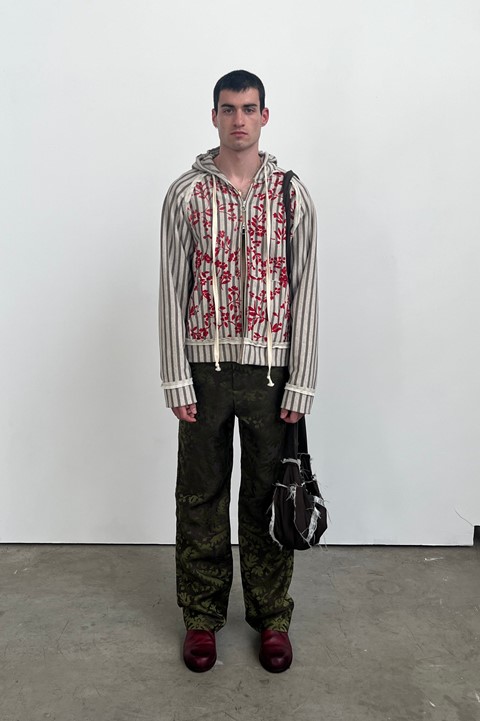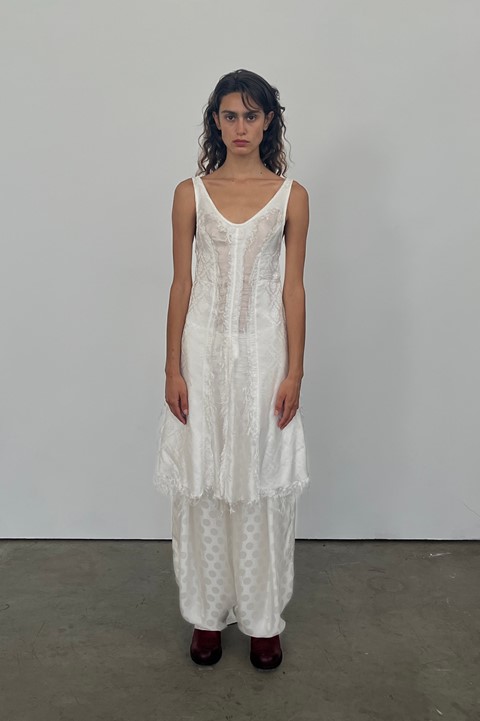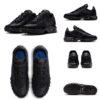
Rewrite
The Madrid-based designer discusses his most recent collection and his intuitive approach to building a label
When Australia-born, Madrid-based designer Edward Cuming launched his eponymous label in 2019, little did he know that a global pandemic was around the corner. “Just after we first spoke back in 2020, we were dropped by Matches Fashion, Opening Ceremony had shut down … the only store that ordered that collection was Comme des Garçons Trading Museum,” he reflects, with a gentle smile. “I really wasn’t sure what would happen next.” But that first bump in the road turned out, luckily, to be only that: today, Edward Cuming is one of the most engaging, steadfast emerging brands in the industry.
If the label began as a sensitive, fluid response to men’s tailoring, over the past four years his quirky, off-kilter designs have seamlessly (and patiently) developed to embrace womenswear, denim (with an off-shoot line cheekily named Cum Jeans), accessories, and shoes created in collaboration with Italy-based designer Adam Signature. “It’s not like we are doing just shirts with bits and bobs, here and there,” he explains of the brand’s now-complete offering. “These have, with time, become part of the brand’s core – of what people expect of the brand and what I expect of me.”
Cuming is always careful not to package his collections in too many words – “just let the clothes talk to you!” – but below he generously shares with us, in his own words, the journey of building his label, from trusting your intuition and consciously creating livelihoods.
“For the past three or four seasons, I’ve consciously challenged the aesthetic, bringing in elements that are a bit unexpected – like fabrics I wouldn’t have used before, in different, jarring contrasts. In fact, the [most recent] collection, Square Hole, came from working intuitively. I felt that I was trying to make a bunch of fabrics that didn’t really fit together work. It reminded me of the saying ‘square peg, round hole’. But I decided to just lean into that feeling. I wanted to create tension in the collection, and I worked with fabrics in compositions, like mixing super-frilly early 2000s camisoles with delicate sequins. And, eventually, it all came together in a strange harmony.
“The industry can be tough to navigate; it can feel socially exhausting at times. You can end up playing a game of clout … So, creating a safe, family-like environment in every aspect of the business is super important to me” – Edward Cuming
“Sourcing from deadstock factories in Spain and Italy was an important part of this collection – and is also a big part of the brand. It’s hard to develop fabrics from scratch and reach the minimums required for production. That’s where deadstock becomes a huge help for finding those shocking, garish fabrics to add texture and richness.
“That being said, from a business perspective, each season you have to be careful not to distract from what the core of the brand is. For any creative person who’s not primarily business-minded, it can be hard to discipline yourself to keep repeating something when you don’t necessarily feel like it. But you really want to nail the ideas home and repeat and repeat and repeat, even if they don’t fully land in the first season. Because if you stick with it, people buy in, and it can pay off. That’s where confidence and intuition come in – I’ve had to learn to really trust myself.

“Patience is such a key value to keep a brand of my size (which is most of the market at the end of the day) going. Being patient and consistent in working – but also in enjoying your life and hoping that translates into the clothes! There’s something to be said for maintaining for as long as you can that niche, undiscovered quality. Especially now, when things are so quickly cycled through the press and then saturated within an inch of their lives. And suddenly people are visually tired of it.
“Everything is made in Spain, except for our shoe collaboration with Adam Signature. At the beginning, there was a lot of hopping around factories, and we got into bed with some pretty unreliable people. It was all part of the learning process, but it did make me hyper-aware of who I was working with. It’s essential for me to meet them in person, get a sense of their vibe, and ask myself, ‘Are they the type to pick up the phone when we’re running late? Or will they leave me hanging for months while I have to answer to the stores?’ Now, I’ve found people across all categories who believe in the brand and have a personal relationship with us. I’d say that’s been even more important than having a media presence or doing presentations.
“The industry can be tough to navigate; it can feel socially exhausting at times. You can end up playing a game of clout, and then it’s just about the names attached to projects. But this can lead young brands down a path that doesn’t feel true to them. So, creating a safe, family-like environment in every aspect of the business is super important to me.

“On that note, I have to give credit to my stylist, Patty [Patricia Villirillo], who’s been with me since the beginning. During development, I’m often making things while consulting with her. She’ll show up in Madrid, sometimes not having seen even 20 per cent of what we’ve made, but she puts it all together in such a believable way. We often talk about whether this person we’re creating for actually exists – would we see them walking down the street?
“For me, it’s natural to treat people with respect: to care about their time, their feelings. And I value that too in the people we work with. If you’re going to create new things and put them out into the world, at least make something that adds real value to people’s lives – whether it’s the people making the clothes, supplying the textiles, or working with you in the studio. You’re helping to create livelihoods, not just products that you slap your name on and send down a runway.”
Edward Cuming is available via the brand’s own website as well as selected stockists worldwide.
in HTML format, including tags, to make it appealing and easy to read for Japanese-speaking readers aged 20 to 40 interested in fashion. Organize the content with appropriate headings and subheadings (h1, h2, h3, h4, h5, h6), translating all text, including headings, into Japanese. Retain any existing
tags from
The Madrid-based designer discusses his most recent collection and his intuitive approach to building a label
When Australia-born, Madrid-based designer Edward Cuming launched his eponymous label in 2019, little did he know that a global pandemic was around the corner. “Just after we first spoke back in 2020, we were dropped by Matches Fashion, Opening Ceremony had shut down … the only store that ordered that collection was Comme des Garçons Trading Museum,” he reflects, with a gentle smile. “I really wasn’t sure what would happen next.” But that first bump in the road turned out, luckily, to be only that: today, Edward Cuming is one of the most engaging, steadfast emerging brands in the industry.
If the label began as a sensitive, fluid response to men’s tailoring, over the past four years his quirky, off-kilter designs have seamlessly (and patiently) developed to embrace womenswear, denim (with an off-shoot line cheekily named Cum Jeans), accessories, and shoes created in collaboration with Italy-based designer Adam Signature. “It’s not like we are doing just shirts with bits and bobs, here and there,” he explains of the brand’s now-complete offering. “These have, with time, become part of the brand’s core – of what people expect of the brand and what I expect of me.”
Cuming is always careful not to package his collections in too many words – “just let the clothes talk to you!” – but below he generously shares with us, in his own words, the journey of building his label, from trusting your intuition and consciously creating livelihoods.
“For the past three or four seasons, I’ve consciously challenged the aesthetic, bringing in elements that are a bit unexpected – like fabrics I wouldn’t have used before, in different, jarring contrasts. In fact, the [most recent] collection, Square Hole, came from working intuitively. I felt that I was trying to make a bunch of fabrics that didn’t really fit together work. It reminded me of the saying ‘square peg, round hole’. But I decided to just lean into that feeling. I wanted to create tension in the collection, and I worked with fabrics in compositions, like mixing super-frilly early 2000s camisoles with delicate sequins. And, eventually, it all came together in a strange harmony.
“The industry can be tough to navigate; it can feel socially exhausting at times. You can end up playing a game of clout … So, creating a safe, family-like environment in every aspect of the business is super important to me” – Edward Cuming
“Sourcing from deadstock factories in Spain and Italy was an important part of this collection – and is also a big part of the brand. It’s hard to develop fabrics from scratch and reach the minimums required for production. That’s where deadstock becomes a huge help for finding those shocking, garish fabrics to add texture and richness.
“That being said, from a business perspective, each season you have to be careful not to distract from what the core of the brand is. For any creative person who’s not primarily business-minded, it can be hard to discipline yourself to keep repeating something when you don’t necessarily feel like it. But you really want to nail the ideas home and repeat and repeat and repeat, even if they don’t fully land in the first season. Because if you stick with it, people buy in, and it can pay off. That’s where confidence and intuition come in – I’ve had to learn to really trust myself.

“Patience is such a key value to keep a brand of my size (which is most of the market at the end of the day) going. Being patient and consistent in working – but also in enjoying your life and hoping that translates into the clothes! There’s something to be said for maintaining for as long as you can that niche, undiscovered quality. Especially now, when things are so quickly cycled through the press and then saturated within an inch of their lives. And suddenly people are visually tired of it.
“Everything is made in Spain, except for our shoe collaboration with Adam Signature. At the beginning, there was a lot of hopping around factories, and we got into bed with some pretty unreliable people. It was all part of the learning process, but it did make me hyper-aware of who I was working with. It’s essential for me to meet them in person, get a sense of their vibe, and ask myself, ‘Are they the type to pick up the phone when we’re running late? Or will they leave me hanging for months while I have to answer to the stores?’ Now, I’ve found people across all categories who believe in the brand and have a personal relationship with us. I’d say that’s been even more important than having a media presence or doing presentations.
“The industry can be tough to navigate; it can feel socially exhausting at times. You can end up playing a game of clout, and then it’s just about the names attached to projects. But this can lead young brands down a path that doesn’t feel true to them. So, creating a safe, family-like environment in every aspect of the business is super important to me.

“On that note, I have to give credit to my stylist, Patty [Patricia Villirillo], who’s been with me since the beginning. During development, I’m often making things while consulting with her. She’ll show up in Madrid, sometimes not having seen even 20 per cent of what we’ve made, but she puts it all together in such a believable way. We often talk about whether this person we’re creating for actually exists – would we see them walking down the street?
“For me, it’s natural to treat people with respect: to care about their time, their feelings. And I value that too in the people we work with. If you’re going to create new things and put them out into the world, at least make something that adds real value to people’s lives – whether it’s the people making the clothes, supplying the textiles, or working with you in the studio. You’re helping to create livelihoods, not just products that you slap your name on and send down a runway.”
Edward Cuming is available via the brand’s own website as well as selected stockists worldwide.
and integrate them seamlessly into the new content without adding new tags. Ensure the new content is fashion-related, written entirely in Japanese, and approximately 1500 words. Conclude with a “結論” section and a well-formatted “よくある質問” section. Avoid including an introduction or a note explaining the process.


